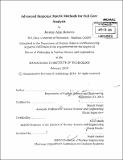Advanced response matrix methods for full core analysis
Author(s)
Roberts, Jeremy Alyn
DownloadFull printable version (17.38Mb)
Other Contributors
Massachusetts Institute of Technology. Department of Nuclear Science and Engineering.
Advisor
Benoit Forget.
Terms of use
Metadata
Show full item recordAbstract
Modeling full reactor cores with high fidelity transport methods is a difficult task, requiring the largest computers available today. This thesis presents work on an alternative approach using the eigenvalue response matrix method (ERMM). The basic idea of ERMM is to decompose a reactor spatially into local "nodes." Each node represents an independent fixed source transport problem, and the nodes are linked via approximate boundary conditions to reconstruct the global problem using potentially many fewer explicit unknowns than a direct fine mesh solution. This thesis addresses several outstanding issues related to the ERMM based on deterministic transport. In particular, advanced transport solvers were studied for application to the relatively small and frequently repeated problems characteristic of response function generation. This includes development of preconditioners based on diffusion for use in multigroup Krylov linear solvers. These new solver combinations are up to an order of magnitude faster than competing algorithms. Additionally, orthogonal bases for space, angle, and energy variables were investigated. For the spatial variable, a new basis set that incorporates a shape function characteristic of pin assemblies was found to reduce significantly the error in representing boundary currents. For the angular variable, it was shown that bases that conserve the partial current at a boundary perform very well, particularly for low orders. For the deterministic transport used in this work, such bases require use of specialized angular quadratures. In the energy variable, it was found that an orthogonal basis constructed using a representative energy spectrum provides an accurate alternative to few group calculations. Finally, a parallel ERMM code Serment was developed, incorporating the transport and basis development along with several new algorithms for solving the response matrix equations, including variants of Picard iteration, Steffensen's method, and Newton's method. Based on results from several benchmark models, it was found that an accelerated Picard iteration provides the best performance, but Newton's method may be more robust. Furthermore, initial scoping studies demonstrated good scaling on an [omicron](100) processor machine.
Description
Thesis: Ph. D., Massachusetts Institute of Technology, Department of Nuclear Science and Engineering, 2014. Cataloged from PDF version of thesis. Includes bibliographical references (pages 195-200).
Date issued
2014Department
Massachusetts Institute of Technology. Department of Nuclear Science and EngineeringPublisher
Massachusetts Institute of Technology
Keywords
Nuclear Science and Engineering.